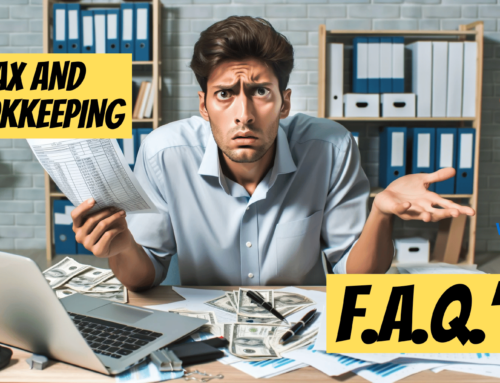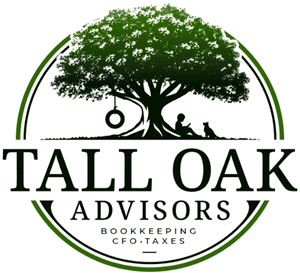When starting your Amazon FBA or Shopify business, there are a lot of tax advantages for doing so!
But, you may have no clue what you can deduct for taxes.
No problem. We’ve put together a master list of common expense categories, along with examples used in real-life eCommerce businesses.
You can find this entire list and track your expenses with our FREE business tax worksheet.
Common Expense Categories for Amazon FBA and Shopify Sellers:
- Advertising. Examples: Social media campaign costs, PPC, email marketing software, billboard advertising, business cards, websites, influencers, SEO, print ads, and online ads.
- Bank Fees. Examples: Credit card processing fees, monthly fees, late fees, wire transfer fees, foreign exchange fees, and ATM fees.
- Business Insurance. Examples: Product liability insurance, liability, errors and omissions, property insurance, and worker’s compensation insurance.
- Business Repairs or Maintenance. Examples: Office refurbishment, software upgrades, HVAC maintenance for warehouse, website maintenance, repairs on computers, pallet jacks, forklifts.
- Business Utilities. Examples: Waste disposal services, electricity, gas, water, and internet service for the office. Some of these costs could be deductible for your home under the business use of home deduction.
- Commission and Fees. Examples: Payment gateway fees, wholesale salesperson, real estate agent, business agent commissions, referral fees.
- Continuing Education. Examples: Professional certifications, courses, webinars, books, seminars, and eCom conference fees.
- Contract Labor (United States). Any independent contractors located in the USA. Examples: IT consultants, Freelance graphic designers, and photographers.
- Contract Labor (Foreign). Workers from outside of the US. The most common are virtual assistants from the Philippines.
- Employee Benefit Programs. Examples: Employee wellness programs, accident and health plans, group life insurance, retirement plan contributions, and dependent care assistance.
- Equipment. Examples: Barcode scanners, security systems, office computers, pallet jacks, racking, wrapping machines, packaging machines, and tape dispensing machines.
- Interest on Loans. Examples: Amazon loan interest, Marcus loan interest, PayPal loan, bank line of credit, equipment financing interest, and credit card interest.
- Internet. Examples: Mobile data plans for business devices, Comcast, Spectrum, AT&T, satellite internet for remote locations, and Google Fiber.
- Inventory. Examples: Import duties, inventory purchased for resale, including sales tax and shipping, and custom packaging for products.
- Inventory Loss / Disposal. Examples: Disposal fees for unsellable stock, expired/damaged items, inventory lost in a warehouse, costs associated with recalling a defective product, and stolen inventory.
- Inventory Prep Service / 3PL. Examples: Prep centers, and logistics warehouse for storage.
- Legal and Professional Services. Examples: Trademark registration fees, Tax preparation, bookkeeping, lawyers, consulting fees, and LLC filing.
- Meals. Examples: Catering for business events, business meeting meals, and meals while traveling.
- Mortgage Interest for Commercial Buildings. Examples: Interest on loans for business property improvements, mortgage interest on a commercial building. This does not include your home residence.
- Office Expenses. Examples: Janitorial supplies, staplers, printers, computers, office software licenses, headphones, desks, and monitors.
- Other Expenses. Examples: Trade show expenses, miscellaneous business expenses, business-related association memberships.
- Rent/Lease of Office/Warehouse. Examples: Equipment rental fees, storage locker, office space lease, warehouse, co-working space. This does not include your home residence.
- Shipping Costs. Examples: Customs brokerage fees, UPS, FedEx, USPS, insurance for shipped goods, PirateShip.
- Software. Examples: Keepa, CRM software, Selleramp, Inventory Lab, email automation tools, Helium 10, Jungle Scout, Data Dive, Seller Snap, Quickbooks, Xero.
- Startup Costs. Examples: Initial website development costs, pre-business expenses like LLC creation, travel, courses, advertising, and market research expenses.
- Subscription Services. Examples: Lead lists, Linkedin Premium, MDS, Seller Basics, and Discord Groups like Arbitrage Ops, Divine, and the Amazon Wholesale Community.
- Supplies. Examples: Safety equipment for warehouse staff, boxes, tape, labels, paper, cleaning supplies, staples, and pens.
- Taxes and licenses. Examples: Business franchise taxes, Business property taxes, payroll taxes, and business licenses. This does not cover the normal income taxes you submit to the IRS with your personal tax return.
- Telephone. Examples: Business landline phone, Cell phone, landline phone at a business, and VOIP service. Landline phones at your home are not included.
- Travel. Examples: Conference registration fees, airfare, Uber, Lyft, rental car, travel insurance, hotel, and Airbnb.
- Vehicle Expenses. Examples: Vehicle depreciation, lease, garage rental for business vehicles, car payment, gas, oil changes, and repairs for business-owned vehicles. However, you only write these off if your business owns the vehicle.
- Vehicle Mileage. Driving your personal vehicle for business use. Examples: Sourcing trips, UPS drop-offs, and visiting suppliers.
- Vehicle Incidentals. Examples: Roadside assistance, tolls, parking, car washes, and DMV for business-owned vehicles.
- Wages (Payroll for W-2). Examples: Payroll for W-2 employees including overtime and bonuses.
Wow! That’s a massive list of things you can write off! It’s a lot to take in, but hey, who said running an eCommerce empire would be a walk in the park?
Now, while this list is pretty comprehensive, it’s not the end-all-be-all. Each business is unique, so there might be more deductions out there tailored just for you. Our best advice? Buddy up with a tax pro who knows eCommerce like the back of their hand. They’re like navigators in the choppy seas of taxes, helping you sail smoothly to savings. Hint, hint: that’s us.
Don’t forget to download our FREE business tax worksheet. It’s like having a neat little container for all those pesky expenses. Trust us, your future self (and your eCommerce tax accountant) will thank you.
Want to learn a little more about this? Check out our YouTube video on this topic:
When starting your Amazon FBA or Shopify business, there are a lot of tax advantages for doing so!
But, you may have no clue what you can deduct for taxes.
No problem. We’ve put together a master list of common expense categories, along with examples used in real-life eCommerce businesses.
You can find this entire list and track your expenses with our FREE business tax worksheet.
Common Expense Categories for Amazon FBA and Shopify Sellers:
- Advertising. Examples: Social media campaign costs, PPC, email marketing software, billboard advertising, business cards, websites, influencers, SEO, print ads, and online ads.
- Bank Fees. Examples: Credit card processing fees, monthly fees, late fees, wire transfer fees, foreign exchange fees, and ATM fees.
- Business Insurance. Examples: Product liability insurance, liability, errors and omissions, property insurance, and worker’s compensation insurance.
- Business Repairs or Maintenance. Examples: Office refurbishment, software upgrades, HVAC maintenance for warehouse, website maintenance, repairs on computers, pallet jacks, forklifts.
- Business Utilities. Examples: Waste disposal services, electricity, gas, water, and internet service for the office. Some of these costs could be deductible for your home under the business use of home deduction.
- Commission and Fees. Examples: Payment gateway fees, wholesale salesperson, real estate agent, business agent commissions, referral fees.
- Continuing Education. Examples: Professional certifications, courses, webinars, books, seminars, and eCom conference fees.
- Contract Labor (United States). Any independent contractors located in the USA. Examples: IT consultants, Freelance graphic designers, and photographers.
- Contract Labor (Foreign). Workers from outside of the US. The most common are virtual assistants from the Philippines.
- Employee Benefit Programs. Examples: Employee wellness programs, accident and health plans, group life insurance, retirement plan contributions, and dependent care assistance.
- Equipment. Examples: Barcode scanners, security systems, office computers, pallet jacks, racking, wrapping machines, packaging machines, and tape dispensing machines.
- Interest on Loans. Examples: Amazon loan interest, Marcus loan interest, PayPal loan, bank line of credit, equipment financing interest, and credit card interest.
- Internet. Examples: Mobile data plans for business devices, Comcast, Spectrum, AT&T, satellite internet for remote locations, and Google Fiber.
- Inventory. Examples: Import duties, inventory purchased for resale, including sales tax and shipping, and custom packaging for products.
- Inventory Loss / Disposal. Examples: Disposal fees for unsellable stock, expired/damaged items, inventory lost in a warehouse, costs associated with recalling a defective product, and stolen inventory.
- Inventory Prep Service / 3PL. Examples: Prep centers, and logistics warehouse for storage.
- Legal and Professional Services. Examples: Trademark registration fees, Tax preparation, bookkeeping, lawyers, consulting fees, and LLC filing.
- Meals. Examples: Catering for business events, business meeting meals, and meals while traveling.
- Mortgage Interest for Commercial Buildings. Examples: Interest on loans for business property improvements, mortgage interest on a commercial building. This does not include your home residence.
- Office Expenses. Examples: Janitorial supplies, staplers, printers, computers, office software licenses, headphones, desks, and monitors.
- Other Expenses. Examples: Trade show expenses, miscellaneous business expenses, business-related association memberships.
- Rent/Lease of Office/Warehouse. Examples: Equipment rental fees, storage locker, office space lease, warehouse, co-working space. This does not include your home residence.
- Shipping Costs. Examples: Customs brokerage fees, UPS, FedEx, USPS, insurance for shipped goods, PirateShip.
- Software. Examples: Keepa, CRM software, Selleramp, Inventory Lab, email automation tools, Helium 10, Jungle Scout, Data Dive, Seller Snap, Quickbooks, Xero.
- Startup Costs. Examples: Initial website development costs, pre-business expenses like LLC creation, travel, courses, advertising, and market research expenses.
- Subscription Services. Examples: Lead lists, Linkedin Premium, MDS, Seller Basics, and Discord Groups like Arbitrage Ops, Divine, and the Amazon Wholesale Community.
- Supplies. Examples: Safety equipment for warehouse staff, boxes, tape, labels, paper, cleaning supplies, staples, and pens.
- Taxes and licenses. Examples: Business franchise taxes, Business property taxes, payroll taxes, and business licenses. This does not cover the normal income taxes you submit to the IRS with your personal tax return.
- Telephone. Examples: Business landline phone, Cell phone, landline phone at a business, and VOIP service. Landline phones at your home are not included.
- Travel. Examples: Conference registration fees, airfare, Uber, Lyft, rental car, travel insurance, hotel, and Airbnb.
- Vehicle Expenses. Examples: Vehicle depreciation, lease, garage rental for business vehicles, car payment, gas, oil changes, and repairs for business-owned vehicles. However, you only write these off if your business owns the vehicle.
- Vehicle Mileage. Driving your personal vehicle for business use. Examples: Sourcing trips, UPS drop-offs, and visiting suppliers.
- Vehicle Incidentals. Examples: Roadside assistance, tolls, parking, car washes, and DMV for business-owned vehicles.
- Wages (Payroll for W-2). Examples: Payroll for W-2 employees including overtime and bonuses.
Wow! That’s a massive list of things you can write off! It’s a lot to take in, but hey, who said running an eCommerce empire would be a walk in the park?
Now, while this list is pretty comprehensive, it’s not the end-all-be-all. Each business is unique, so there might be more deductions out there tailored just for you. Our best advice? Buddy up with a tax pro who knows eCommerce like the back of their hand. They’re like navigators in the choppy seas of taxes, helping you sail smoothly to savings. Hint, hint: that’s us.
Don’t forget to download our FREE business tax worksheet. It’s like having a neat little container for all those pesky expenses. Trust us, your future self (and your eCommerce tax accountant) will thank you.
Want to learn a little more about this? Check out our YouTube video on this topic:



